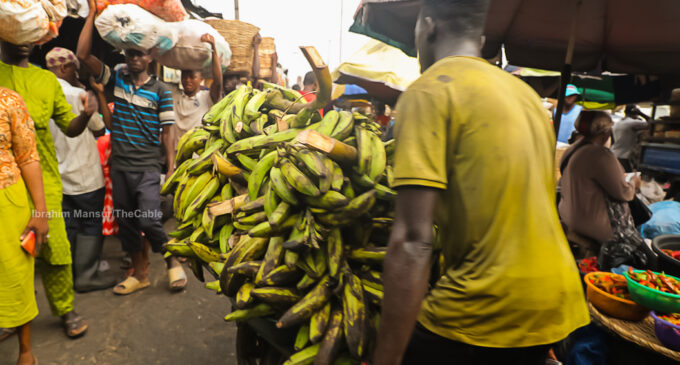Insecurity: Quest for food security, while we all pretend

That, it has not been the best of times for Nigerians in the past nine months, is to state the obvious. Prices of foodstuffs and other essential commodities have, during the period under review, almost quadrupled while income remains, at best, stagnant. This is just as inflation has aggressively eroded the people’s purchasing power. Feeding, categorised as one of the most basic necessities of human being, according to the Abraham Maslow’s hierarchy of needs, has become a kind of luxury in many homes across the country, with the quality of the meal being of secondary consideration for those who can even afford it, and are also conscious of their dietary needs.
“Just eat what you can afford, God will balance the diet”, according to a Facebook post by one of the users on my friends list. These added to the current resurgence in the wave of violent abduction of persons, including pupils from their homes and schools, by bandits in parts of the country, is to say the least too much.
A 50 kg bag of rice is now being sold, at almost quadruple its price, pre-May 29 2023. Price of a 50 kg bag of rice ranges between ₦60,000, and ₦97,000, depending on the brand you’re buying, and the location. The price of a pack of noodles, one of the most popular staples for kids and some adults, became doubled in February 2024, within a fortnight. Ditto for semo vita and wheat flowers. The prices of medications are not left out. A one-liter bottle of Chemiron (blood) tonic that sold for under ₦2,050 late last year is now hugging ₦4,000. A pack of paracetamol tablet that I used to buy at ₦450, is now between ₦1,200, and ₦1,500, depending on the brand. The last time I bought a sachet of Augumentin tablet (one of the broad spectrum antibiotic drugs), it was around ₦4,300. But now it is ₦26,000. Yes, that is not a typo – twenty-six thousand Naira. Cement manufacturers believe they should not be left out in the scramble for the “windfall”. From about ₦3000, to over ₦11,000, but now back to about ₦7000, following the intervention of the Federal Government. So, it has been a national festival of profiteering.
Of all of these prices increase, the one that bites the hardest is that of foodstuffs. There has been artificial scarcity occasioned by the unwholesome activities of “food speculators” who are hoarding food items in the country. Another of the major reasons for the scarcity was laid bare by the Economic and Financial Crimes Commission (EFCC), when its operatives intercepted a convoy of Chad-bound trailers laden with foodstuffs, when local demands are still far off from being met. But my very good friend, Ore Olugbenga – an Abuja-based legal practitioner, and a public affairs commentator, during one of our numerous chats recently, made me realise that, it (exporting food items to neighbouring West African countries like the Niger Republic, Chad, and Cameroon) has been an age-long thing. He knows that much because he did his National Youths Service scheme (NYSC) in a border town in Katsina State some decades ago. So he witnessed it, at a very close quarter. He explained that, the only reason it is making the headlines now is that, supply had fallen, due to the insecurity-enforced absence of farmers from their farmlands. Production has virtually stopped in most of the food supply hubs in the country, while demand outstrips supply. Remember, in the interaction of the market forces (of demand and supply), once the demand outstrips supply, consumers would be at the mercy of the supplier – the price goes out of the roof, especial in a capitalist setting with a very weak regulatory framework like ours. And some of the commercial farmers who do not have the interest of the nation, and that of humanity at heart decide to prioritise profit-making over our national “food security” by exporting the little that there is, while Nigerians go hungry.
As local demands remain largely unmet, those greedy Nigerian Agripreneurs have the mind to export food to the neighbouring countries, with a view to making more profit, as opposed to when they sell locally. Would you blame them, when exporting becomes even more attractive, as the country’s currency – the Naira continues to lose its value against other currencies like the France CFA? I doubt it because if you were in their shoes, you’re more likely than not, to do the same, or even worse. One CFA now, I was made to understand, exchanges for ₦2.69. I do understand that some of them have taken loan with exorbitant interest rates to embark on food production ventures. They need to pay back those loans and make profits for their own efforts. But be that as it may, national interest should be uppermost in their thought processes.
Under normal circumstances, upscaling production is the way to go, when a country’s currency loses its value against other international currencies. That is, the most logical thing to do to restore the value, is to ramp up local production for export, and scale down on importation of goods, especially those that could be produced locally, and those that are not so essential to the country’s corporate being. But there has been no enough to feed the local population, to make exporting the little we produce a subject of export. In Nigeria, it is not as though we lack the capacity, or the arable-enough land, to produce, but the conducive atmosphere for the farmers to be productive has been eroded by the existential threat of insecurity. Yet, we pretend as if security is not a factor in our drive to ramp up local food production. Barrister Ọrẹ argued further that, the region that could be referred to as the food belt of the nation, which is coincidentally known as the “Middle Belt” geo-political zone, comprising Benue, Niger, Kwara, Kogi, and Nasarawa States, as well as the rural parts of the Federal Capital Territory (FCT) have become overwhelmed by insecurity. This is safe for Kwara State, which has faced less of a security challenge than the rest of the States in the belt. The majority of the rural farmers, especially in Benue are in IDP camps scattered across the State, and beyond. The same also goes for agrarian settlements in the core northern States of Kaduna, Katsina, Sokoto, Zamfara, and Kebbi. That of the north East needs no further elaboration. In Borno, for instance, more than half of the rural population (farmers) are now resident in IDP (internally displaced persons) camps in Maiduguri, the State capital, while very few could be found in the various local government headquarters in the State. So, there is virtually nobody on the farms, due to the chronic insecurity. The irony of it all is that, those who were feeding the nation before, have now joined the league of those who need to be fed. The ultimate effect is the food crises we’re currently facing.
While we continue to pretend that insecurity is not in any way contributing to the worsening situation, and avoid stating the facts as they are, simply because we would rather not be seen as being opposed to the government of the day, our existence as a sovereign nation continues to be under increasing threat. While we continue with the pretense, hunger is beginning to ravage the land like never before, turning some hitherto law-abiding citizens into chronic lawbreakers.
Nowadays, being kidnapped no longer requires you to be in the bush, or on the road. The bandits now take their criminal trades to people’s homes, and places of work. Recently in Kaduna, a State reputed for being a host to the highest number of military establishments in Nigeria has been gasping for breath, under the vise-like grip of bandits who have abducted no fewer than 400 persons, including about 287 pupils in the State.
If people are no longer feeling safe, or are not actually safe, in their homes or on the roads; if pupils are no longer safe in the schools; if workers are no longer safe in their places of work, tell me how farmers would feel safe in desolate places like their farmlands?
We can gather all the politicians, and experts in this world in as many Abuja hotels’ conference rooms as possible, to “blow grammar” from now until thy kingdom comes, discussing how to curb the current food crisis in the land, if farmers are not made to feel safe enough to want to return to the field, and are actually made to return to their farms, we may end up not smelling the supposed benefits of the current bitter fiscal pills (fuel subsidy removal, and floating of the country’s currency) that agents of the Bretton Woods institutions in President Bola Tinubu’s government are forcing down our throats, let alone, enjoy them.
We may continue to pretend that the current food crisis and insecurity are two parallel lines that would never meet, while the legitimacy of the government’s at all levels is being daily called to question. We may fold our arms and watch it (the legitimacy of the government) being questioned on the ground that the administration is not delivering the goods in the area of security, being the primary responsibility of a responsible, and responsive government. But by the time it explodes in our faces, I wonder how many of us would survive to tell the story.
If we all agree that the way out of the current quagmire is to ramp up food production, then we need to pay much more attention than we currently do, to the safety of lives and properties of those who would drive the vision of “self-sufficiency in food production” – the farmers.
Securing the lives and properties of these farmers, who I love to refer to as “national treasures” must be the number one priority of the government.
I am not going to sit down in my little space here and pontificate on how the government should go about tackling the security challenges because that is not my area of core competence. Those who are well-read in the field have written/said enough on that. It is up to the federal government to buckle up, and double down on whatever strategy they decide to adopt among those that have already been proffered by experts, before it is too late, as we appear set on the road to Colombo. God forbids.
Ramadan Kareem to my Muslim readers across the globe.
Abubakar writes from Ilorin. He can be reached via [email protected].
Views expressed by contributors are strictly personal and not of TheCable.
















There are no comments at the moment, do you want to add one?
Write a comment